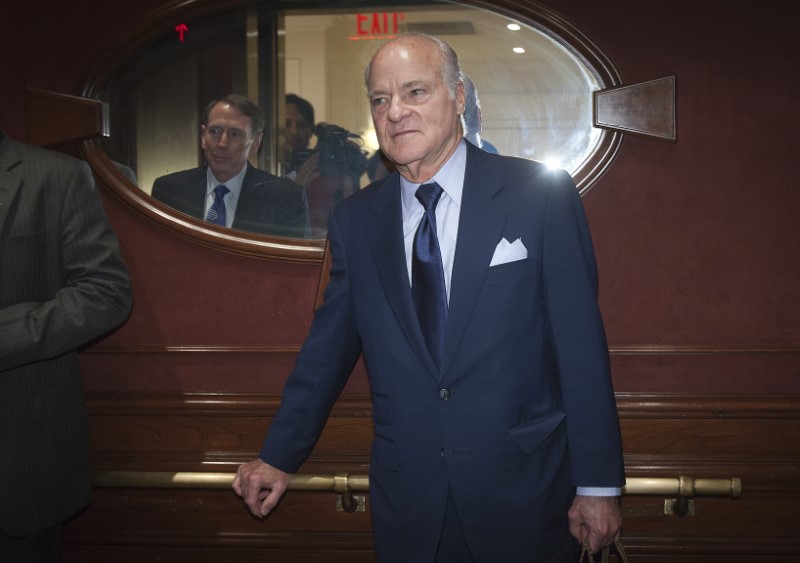By Greg Roumeliotis
(Reuters) - KKR & Co LP (N:KKR), the private equity firm founded and headed by Henry Kravis and George Roberts, said on Monday it had appointed Joseph Bae and Scott Nuttall as co-presidents and co-chief operating officers, setting them up as its future leaders.
The move represents the biggest shakeup in the 41-year-old firm's history since KKR's other co-founder, Jerome Kohlberg Jr, left it in 1987. It positions Bae and Nuttall to take over from Kravis and Roberts when the 73-year-olds decide to step down.
"Having joined the firm together over 20 years ago, Joe and Scott have a strong foundation of trust, professional respect and personal friendship that is critical for success," Kravis and Roberts, who will continue to serve as co-chairmen and co-chief executives, said in a statement.
Unlike publicly listed peers such as Blackstone Group LP (N:BX), Carlyle Group LP (O:CG) and Apollo Global Management LLC (N:APO), KKR has never before named a president or someone with an equivalent title, a job that could serve as a stepping stone to eventually leading the entire firm.
This was partly because of Kravis' and Roberts' concerns about alienating other members of their senior leadership team, sources inside the New York-based firm, who had identified Bae and Nuttall as frontrunners in the succession race, told Reuters in 2014.
Those concerns were proven right on Monday as Alexander Navab, KKR's private equity chief in the Americas who was also hoping to succeed Kravis and Roberts, disclosed he would leave the firm following "an orderly transition."
KKR's chief administrative officer Todd Fisher, another possible successor, also announced on Monday his intention to depart from KKR at the end of the year to pursue a career not related to investments. KKR said Fisher's decision was unrelated to KKR's move to appoint co-presidents.
Bae, 45, was previously managing partner of KKR Asia and the global head of KKR's infrastructure and energy businesses. In his new role, he will focus on KKR’s global private equity businesses as well as its energy, infrastructure and real estate business, the firm said.
Nuttall, 44, served previously as head of KKR's global capital and asset management group. In his new role, he will concentrate on KKR's corporate and real estate credit, capital markets, hedge fund and capital raising businesses, together with KKR's corporate development, balance sheet and strategic growth initiatives, according to the firm.
Both Bae and Nuttall joined KKR in 1996. Nuttall had previously spent less than two years at Blackstone, while Bae had a similarly short stint at Goldman Sachs Group Inc's (N:GS) principal investments group.
Nuttall rose to become head of KKR's financial services investment team and also became involved early on with the firm's diversification into debt investments, which started in 2004. He also played a key role in taking KKR public, a process that involved merging the firm with an Amsterdam-listed fund in 2009 and then moving the listing to New York in 2010.
Bae was sent to Hong Kong in 2005 at the age of 33 to kick-start the firm's business in Asia, a diverse and fast-growing region whose capital markets are, for the most part, less developed, and in which several private equity firms accustomed to Western-style leveraged buyouts have struggled.
The Korean-American dealmaker's team launched its first Asian private equity fund in 2007, raising $4 billion from investors. Its success led to KKR raising a successor fund that amassed $6 billion, making it the largest private equity fund dedicated to Asia.
KKR last month announced it had completed raising a third private equity fund for Asia, amassing $9.3 billion.
DAY-TO-DAY OPERATIONS
Bae and Nuttall will now be jointly responsible for the day-to-day operations of KKR, as Kravis and Roberts, who each have a net worth of $5.1 billion according to Forbes, focus more on cultivating relationships with investors and mentoring young talent.
Kravis and Roberts, who are cousins, pioneered leveraged buyouts through the eponymous firm they created in 1976 alongside Kohlberg, with an initial investment of $120,000.
By attracting money from some of the world's largest institutional investors such as pension plans and sovereign wealth funds, the firm grew from a single $30 million fund in 1978 to around $140 billion in assets under management currently, spanning private equity, credit and real estate.
KKR gained widespread recognition early on through its $25 billion leveraged buyout of tobacco and food conglomerate RJR Nabisco in 1988, a battle that was immortalized in the bestseller 'Barbarians at the Gate.'
With a market capitalization of $15.7 billion, KKR has seen its shares soar 53 percent in the last 12 months, as the wider market rally buoyed the value of its assets.
Still, the stock is seen by many investors as undervalued compared to big asset managers such as BlackRock Inc (N:BLK). Activist hedge fund ValueAct Capital Management LP unveiled a 4.9 percent stake in KKR in April, arguing KKR's shares have the potential to reach $37.

Shares closed trading on Friday at $19.25.